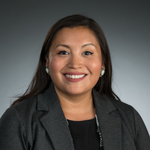Where Are They Now? With Dr. Colin Ben, Cohort 1

Kristen Talbert
Indigenous Leadership Academy Program Manager
The American Indian Policy Institute’s Indigenous Leadership Academy (ILA) is currently running its second cohort! Sign up here to follow along and receive ILA updates.
Our second guest in the “where are they now” series is Dr. Colin Ben. During the Indigenous Leadership Academy, Colin always asked deep and thought-provoking questions. I’ve added his bio and some questions and answers; I asked about how ILA has impacted his life and what it’s like working in higher education.
Colin Ben is a citizen of the Navajo Nation originally from Shiprock, New Mexico. He is an Assistant Research Professor and Lead of the Online Master of Arts in Indigenous Education in the School of Social Transformation, and he is also the Associate Director of the Center for Indian Education at Arizona State University. Colin earned his Ph.D. degree in Educational Leadership and Policy from the University of Utah, an M.A. degree in American Indian Studies from the University of Arizona, and a B.A. degree in Southwest Studies from Fort Lewis College.
As part of ILA, participants are asked to create a project that helps the community. What was your project idea and how did the tools from ILA help you grow that idea?
My project was exploring and refining ways to strengthen our recruitment initiatives for the Online Master of Arts in Indigenous Education. As the program expanded our American Indian and Alaska Native recruitment to include Native Hawaiian students, I applied the knowledge I gleaned from our weekly virtual gatherings to strengthen my recruitment strategy. As I discussed my project to my small group, they provided valuable feedback through multiple perspectives given their professional expertise areas. The Indigenous leadership case studies and models were helpful in that they provided a framework that guided our conversations.
What was your most surprising takeaway from the cohort?
I felt like a student again! The articles, videos, and guest speakers provided information for us to engage in weekly discussion. The cohort participants came with expertise from multiple professional backgrounds, which enhanced my learning and understanding of the multiple forms of leadership that positively impact Indigenous communities and stakeholders. Another important takeaway was acknowledging how our facilitators kept us engaged and on track. Ahxe’hee’ Jolyana, Kris, Kristen, and Dr. Gonzales.
How has ILA impacted your life since completing the Academy?
I am grateful to have been a participant in the first ILA cohort. Our weekly virtual gatherings provided a safe space for me to learn and talk about multiple forms of leadership and what that looks like in an Indigenous context. A common theme that emerged throughout our cohort and small group discussions was the importance of relationships. As cohort participants who are Indigenous leaders from 11 different tribal nations, we were able to build our professional networks from many Native communities in Arizona. Since the completion of ILA, cohort participants have shared information to resources that relate to the work I do and encouraged me to apply. That level of support is appreciated. Lastly, it’s exciting to reconnect with participants in-person at Native conferences. As we update each other since we completed the academy, I continue to be inspired by the heart-work they are doing in Indian Country.
What is your research focus as an educator and why is that important to you?
I am passionate about issues of access, advancing culturally responsive educational partnerships and programming among diverse communities, as well as ensuring a respectful and supportive climate in higher education for Indigenous, first-generation, low-income and historically underrepresented students. My research focuses on the intersection of access, persistence, and higher education policy. These research areas and issues are important to me because they inform my work as a student mentor, advocate, and administrator.
As an Indigenous educator in higher education, how do you give back to the Indigenous student community at ASU?
I have been fortunate to have worked in the field of higher education for the past 15 years. The concept of giving back to our Indigenous communities has always been at the center of my advocacy. As I work with and for Indigenous students, a few examples of how I give back are by sharing my skill sets on conference/symposium planning committees, reviewing scholarship applications, and developing webinar series. I continuously explore opportunities and resources that support Indigenous students’ academic success. I enjoy collaborating with folks throughout campus to increase ways we can meet the needs of our students.